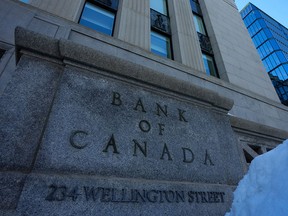About Half of Canadian Businesses See a Mild Recession Looming, Bank of Canada Survey Finds
The Bank of Canada has released its first-quarter survey, which reveals that about half of Canadian businesses expect a mild recession over the next year. This is a decrease from the fourth quarter, where two-thirds of respondents anticipated a recession.
Business Sentiment Drops Slightly
While the business sentiment index dropped slightly to 35 per cent in the first quarter from 36 per cent in the fourth quarter, it remains higher than the 60 per cent recorded in the second quarter of last year. This indicates that businesses are still cautious about the economic outlook.
Inflation Expectations Remain High
The survey also found that most firms expect inflation to stay above two per cent until at least 2025. A significant majority (59 per cent) of respondents believe that inflation will remain high, with 79 per cent expecting it to stay above three per cent for the next two years.
Central Bank’s Rate Hike
In an effort to combat inflation, which peaked at an annualized rate of 8.1 per cent last year and slowed down to 5.2 per cent in February, the Bank of Canada raised its key overnight interest rate eight times by a total of 425 basis points over the past year. The bank has left its interest rate on hold at the 15-year high of 4.5 per cent in March.
Labour Market Remains Strong
Despite concerns about a potential recession, Canada’s labour market remains strong. The survey showed that the average size of planned wage increases is above its historical average. However, for the first time in two years, the labour shortage intensity indicator fell into negative territory.
Consumer Expectations and Inflation
According to a separate quarterly survey conducted by the Bank of Canada, 37.7 per cent of consumers expect "a moderate decline" in the economy, while 20.3 per cent anticipate a "significant decline." Consumer expectations for inflation have eased, with an average forecast of 6.03 per cent over the next year, down from the previous survey’s prediction of 7.18 per cent.
Bank Failures and Potential Credit Crunch
The recent failures of U.S. lenders Silicon Valley Bank and Signature Bank, followed by Credit Suisse Group AG’s rescue, have raised concerns about a potential credit crunch triggered by banking stress. However, an online business survey released on April 3 suggested that "business sentiment has not changed much" since the bank failures.
Implications for Monetary Policy
The Bank of Canada will likely take into account these survey results when making its monetary policy decisions. The central bank has signaled that it would pause further rate hikes if inflation came down in line with its forecasts, reaching its two-per-cent target next year.
Comparing Canadian and U.S. Economies
The Bank of Canada’s survey findings provide insight into the Canadian economy’s outlook, which differs from the more pessimistic projections for the United States. The differing expectations reflect the unique circumstances and characteristics of each country’s economy.
Conclusion
The Bank of Canada’s first-quarter survey reveals that about half of Canadian businesses expect a mild recession over the next year. While business sentiment remains cautiously optimistic, firms continue to anticipate high inflation until at least 2025. As the central bank monitors these trends and considers the implications for monetary policy, it will need to balance its efforts to combat inflation with the potential risks of triggering a recession.
What You Need to Know
- About half of Canadian businesses expect a mild recession over the next year.
- Business sentiment remains higher than in the second quarter of last year but has dropped slightly from the fourth quarter.
- Firms anticipate high inflation until at least 2025, with most expecting it to stay above two per cent.
- The labour market remains strong, but the labour shortage intensity indicator has fallen into negative territory for the first time in two years.
- Consumer expectations for inflation have eased, but concerns about a potential credit crunch due to bank failures persist.
Sources
- Bank of Canada’s first-quarter survey
- Separate quarterly survey conducted by the Bank of Canada
- Thomson Reuters 2023

